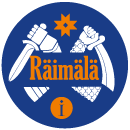Annakaisa Vääräniemi
09/01/2016
According to the dietitian, both extremes are dangerous — when you have an excess of iodine or a deficiency of iodine.
Weakness and fatigue. Thoughts flow very slowly.
Oddly enough, this may symptoms of iodine deficiency.
To cheer up, many drink caffeinated drinks or eat vitamin pills. “But vitamins do not usually help,” says dietitian Soile Ruottinen from the Mehiläinen Clinic.
“You rarely realize that the solution to the problem can be a lack of such an important nutrient as iodine.”
“According to the population studies, the iodine presence in food is very low,” says Ruottinen.
Adult Finns usually experience a slight iodine deficiency. Almost 35% of the population have moderate or severe iodine deficiency.
Iodine is an essential nutrient that is necessary, in particular, to build hormones in the thyroid gland, as well as for normal growth and development of the fetus and the baby. In the worst case scenario, iodine deficiency can lead to thyroid growth, i.e. to the occurrence of goiter, which is also accompanied by thyroid problems.
Salt, milk, eggs, fish...
Ruottinen speaks of a key rule that guarantees sufficient iodine. “Iodine is best absorbed from iodine-containing salt, dairy products, chicken eggs and fish,” explains the doctor.
“You will receive a sufficient amount of iodine if you eat
“It is also recommended to choose iodized salt and products that contain iodized salt. This is indicated on the packaging, among the ingredients.”
According to Ruottinen, iodine consumption is not an issue if a person eats dairy products. However, if your daily menu does not include dairy, then you may be prone to iodine deficiency.
Vitamin pills for vegans
“If you excluded products of animal origin and dairy products from your diet, or replaced them with drinks containing vegetable proteins, such as soy or oat milk, you need to follow the so-called vegan recommendations,” says Ruottinen.
“Vegans, i.e. people who eat only plant-based foods, have the most risk in the population to intake the less iodine with food. Vegans and dairy-free diet followers should take multivitamins containing enough iodine. However, when taking pure iodine as a pill, it is easy to exceed the dose.
The same applies to seaweed products with a high iodine content, for which the exact iodine content is either unknown or is very high. Some algae even are so rich in iodine that it is dangerous to humans,” explains Ruottinen.
Iodine overdose is as dangerous as its deficiency. It is impossible to eliminate iodine deficiency among the population by a mere mass consumption of iodine additives. Nutritional supplements are only recommended for vegans and those who follow dairy-free diets. The problem must be solved differently: the entire population must be eating enough iodine with food.
The ready-to-eat food industry is heading in the right direction
The recommendations of the State Nutrition Commission say that the best way to improve the intake of iodine is iodized salt. The recommended dose is 150 micrograms per day.
According to Ruottinen, Finns now receive less iodine than before, as more and more Finns eat ready-made food and have lunch in cafeterias at work. “The food industry has not used iodized salt before,” says Ruottinen, “but many companies have already begun to change this.”
Many bakeries and manufacturers of ready-made food have made some important steps over the past year and began to use iodized salt.
Natural sources of iodine and recommendations for the balanced diet followers
- Milk, kefir or other dairy products, for example, yogurt or cottage cheese —
50–60 g/day (75–90 mcg of iodine) - Cheese,
2–3 slices —20–30 g/day (4–6 mcg of iodine) - Fish, 100 g/serving,
2–3 servings/week (10–15 mcg of iodine) - Chicken eggs,
2–3 eggs/week (9–14 mcg of iodine)
Plus: iodized salt 0.5 teaspoon = 2.5 g/day (25 mcg of iodine)
Total iodine intake from the listed products:
If you use iodized salt in the amount of half a teaspoon per day, then the intake of iodine rises to
Source: menaiset.fi/artikkeli/hyva-olo/terveys/ravitsemusterapeutti-suomalaisilla-lieva-jodin-puutos-nain-korjaat (Me Naiset, Finnish magazine for women)
Soile Ruottinen, Dietitian, State Nutrition Commission
